You want the most reliable etl tools for enterprise data integration to handle large-scale, complex data environments. Reliability, scalability, and automation shape your success with etl by reducing manual errors and supporting real-time data synchronization. FineDataLink stands out as a modern, scalable etl solution, while tools like Talend Data Integration and Informatica PowerCenter also lead the market. Here are the most reliable ETL tools you can try:
| ETL Tool | Average Rating | Key Features |
|---|---|---|
| Talend Data Integration | 4 out of 5 | Fast implementation, Data quality, Data governance, Automation & Scheduling |
| Informatica PowerCenter | 4.4 out of 5 | Automated data ingestion, Robust security options, Advanced analytics, Scalability |
You should compare these tools by real-time integration, ease of use, cost, and support to find the best fit for your enterprise data needs.
When you search for the most reliable etl tools for enterprise data, you find several solutions that stand out for their performance and adoption in large organizations. These tools help you manage complex data environments and support your business intelligence needs. You need etl platforms that offer scalability, automation, and robust integration features. The following table highlights the top etl solutions recognized for their reliability and enterprise-grade capabilities:
| ETL Solution | G2 Rating | Key Features |
|---|---|---|
| Portable | 4.9 | Quick development of custom connectors, hands-on support, fixed pricing model for API-to-warehouse. |
| Talend | 4.0 | Efficient large-scale data structures, data quality features, robust data governance tools. |
| Informatica PowerCenter | 4.4 | Automates data movement, prioritizes data security, supports advanced analytics. |
| Oracle Data Integrator | 4.0 | Advanced tools for complex data transformation, compatible with Hadoop and NoSQL databases. |
| Integrate.io | 4.3 | Low-code platform, supports over 100 SaaS applications, features Field Level Encryption for security. |
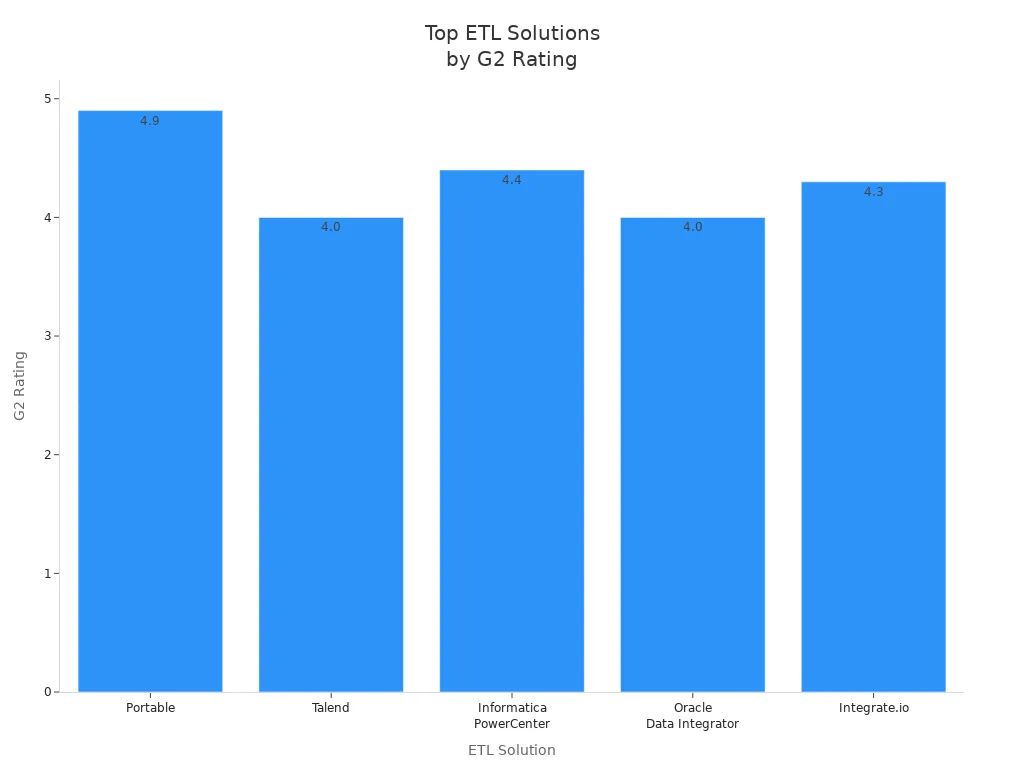
You see that Informatica PowerCenter, Talend, and Oracle Data Integrator consistently rank among the most reliable etl tools for enterprise data. These platforms offer advanced features that help you automate data movement and maintain high data quality. Portable and Integrate.io also provide strong options, especially if you want quick connector development or a low-code approach.
Market share data shows that large enterprises invest heavily in etl infrastructure. Informatica leads with 14.8% market share and serves hundreds of high-value customers. The top five vendors, including IBM, Microsoft, Oracle, and Qlik/Talend, control most of the market. This dominance reflects the maturity and complexity required for enterprise-grade etl deployments.
You rely on etl tools to move and transform data across your organization. Reliability ensures that your data remains consistent and accurate. When you use the most reliable etl tools for enterprise data, you reduce the risk of errors and downtime. Unreliable etl processes can cause data inconsistencies, processing errors, and inefficiencies. These problems affect your decision-making and can lead to legal or reputational issues if you mishandle sensitive data.
Statistical evidence shows that poor data quality costs organizations an average of $12.9 million. Early checks and automated testing can reduce issues by 40–60%. Elite teams achieve change-failure rates of 5% or less, which stabilizes data releases and lowers costs.
| Evidence Description | Statistic | Impact on Business Outcomes |
|---|---|---|
| Average losses due to bad data | $12.9M | Indicates significant financial impact of poor data quality |
| Reduction in issues through early checks | 40–60% fewer issues | Enhances operational efficiency and reduces costs |
| Change-failure rates for elite teams | ≤5% | Highlights effectiveness of automated testing in stabilizing data |
You need reliable etl tools to protect your business from these risks. When you choose the most reliable etl tools for enterprise data, you build a foundation for accurate analytics, efficient operations, and strong compliance.

You encounter ETL every time you need to combine information from different systems in your organization. ETL stands for Extract, Transform, Load. This process plays a vital role in enterprise data integration. You use ETL to bring together data from multiple sources, creating a single source of truth for analysis and reporting.
ETL helps you collect, clean, and move data so you can make informed decisions.
The ETL process includes three main steps:
You often follow these steps:
When you use ETL, you simplify complex data environments and support business intelligence across your enterprise.
You face several challenges when you implement ETL in enterprise data integration. Large workloads can slow down your network, causing delays in data processing. Unoptimized code may introduce errors and reduce the speed of your ETL jobs. Data quality issues, such as outdated or duplicate records, can affect the reliability of your results.
Common challenges include:
You also deal with:
You must address these challenges to ensure your ETL workflows remain efficient and reliable. By understanding these obstacles, you can choose the most reliable ETL tools for enterprise data integration and build a strong foundation for your business intelligence needs.
When you compare the most reliable ETL tools for enterprise data integration, scalability becomes a top priority. You need a solution that can handle increasing volumes of data without losing performance. FineDataLink excels in this area, supporting real-time data synchronization and efficient data management across multiple sources. You benefit from features like auto-scaling clusters and parallel processing, which help maintain high throughput and low latency. The following table shows key performance metrics that impact scalability:
| Performance Metric | Description |
|---|---|
| Data Throughput | Indicates how quickly data is processed through the ETL stages, essential for high performance. |
| End-to-End Latency | Measures the time taken from data extraction to loading, impacting overall system responsiveness. |
| Job Reliability | Ensures that ETL jobs complete successfully without failures, crucial for maintaining data integrity. |
| Resource Utilization | Reflects how efficiently the system uses available resources, affecting scalability and cost. |
| Parallelism | The ability to process multiple data streams simultaneously, enhancing throughput and performance. |
| Schema Drift Handling | Automatic adjustments to changes in data structure, vital for maintaining reliability at scale. |
| Compliance Features | Role-based access control and encryption are necessary for data governance in large datasets. |
| Auto-scaling Clusters | Adjust resources dynamically based on workload, ensuring performance during peak times. |
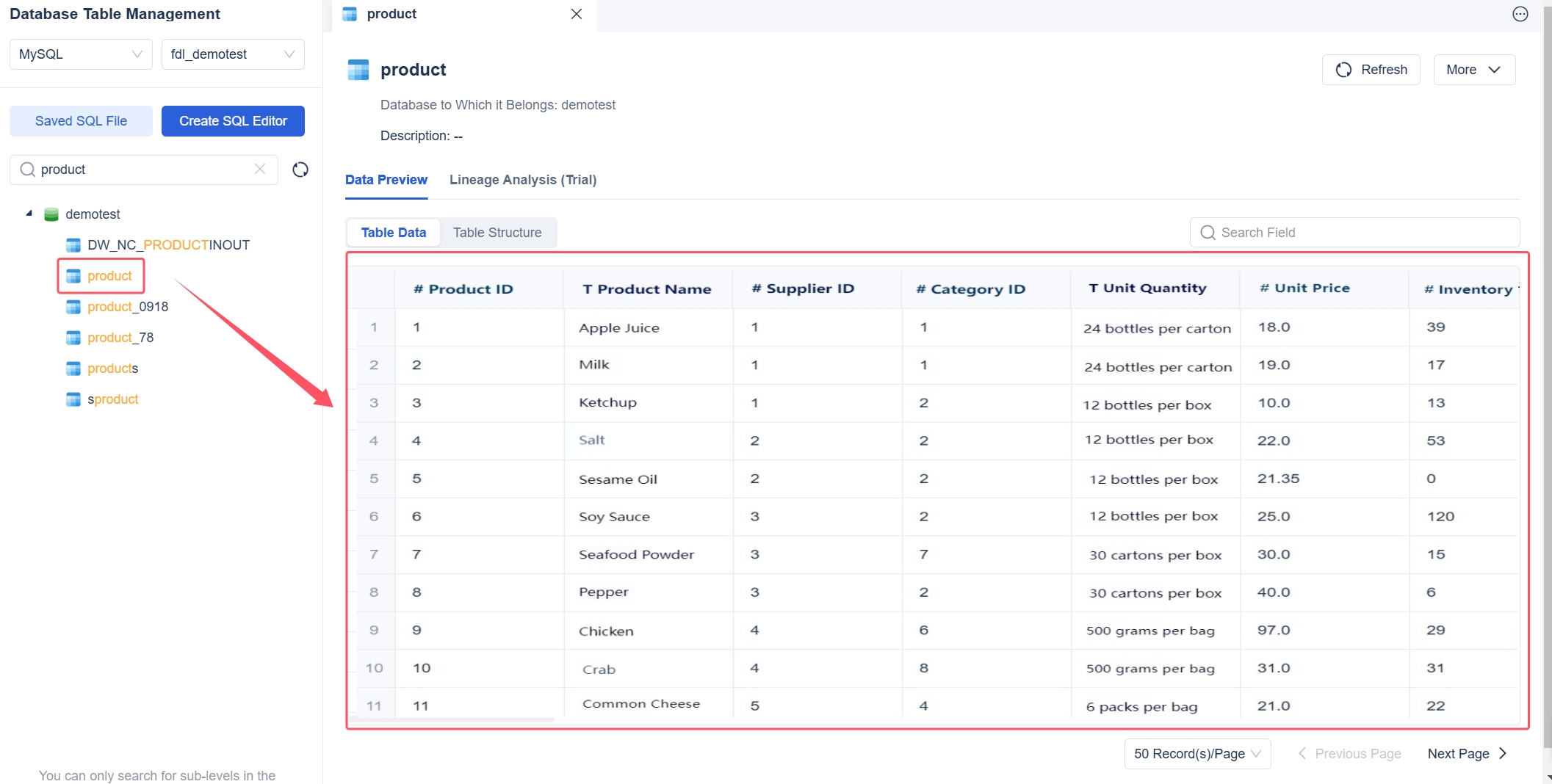
Automation drives reliability in ETL processes. You want automated data processes that reduce manual intervention and errors. FineDataLink offers a low-code interface, making it easy to set up real-time data pipelines and automate scheduling, notifications, and data quality checks. Leading ETL tools provide features such as:
Automation helps you maintain reliable, real-time data flows and supports efficient data management.
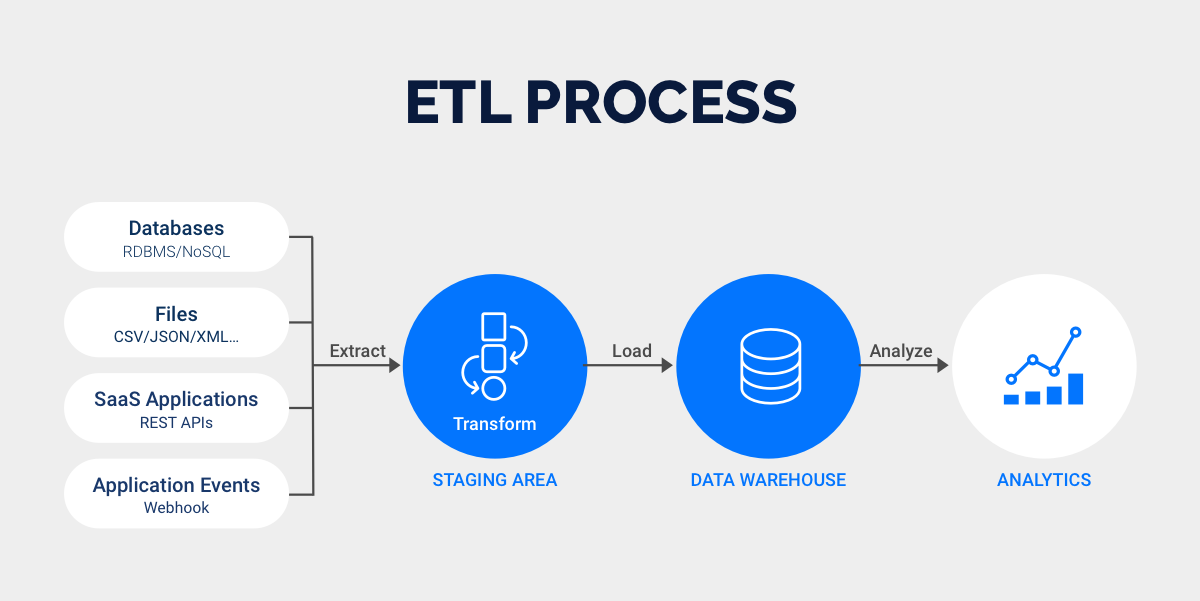
Integration capabilities set the best ETL tools apart. You need data integration tools that connect with a wide range of sources, including databases, cloud platforms, and SaaS applications. FineDataLink supports over 100 common data sources, enabling you to synchronize and transform both structured and unstructured data in real-time. Top solutions like Informatica PowerCenter, IBM DataStage, and Oracle Data Integrator excel in complex transformations, while modern platforms such as Matillion and Hevo Data focus on ease of use and automation.
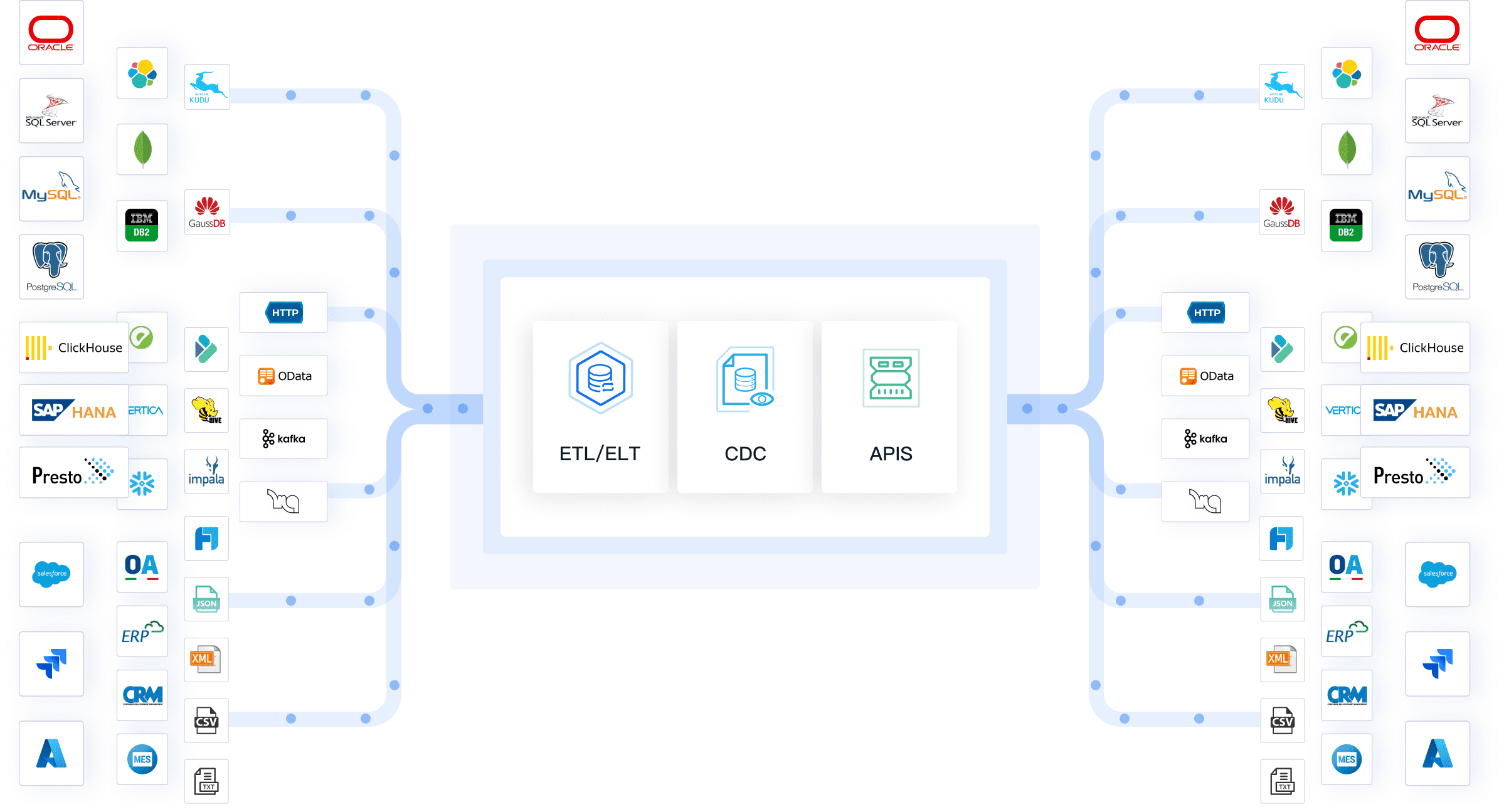
Cost plays a major role when you compare ETL tools for enterprise data integration. You need transparent pricing that fits your budget and scales with your needs. FineDataLink offers a cost-effective solution with flexible licensing. The chart below compares typical costs for leading ETL vendors:
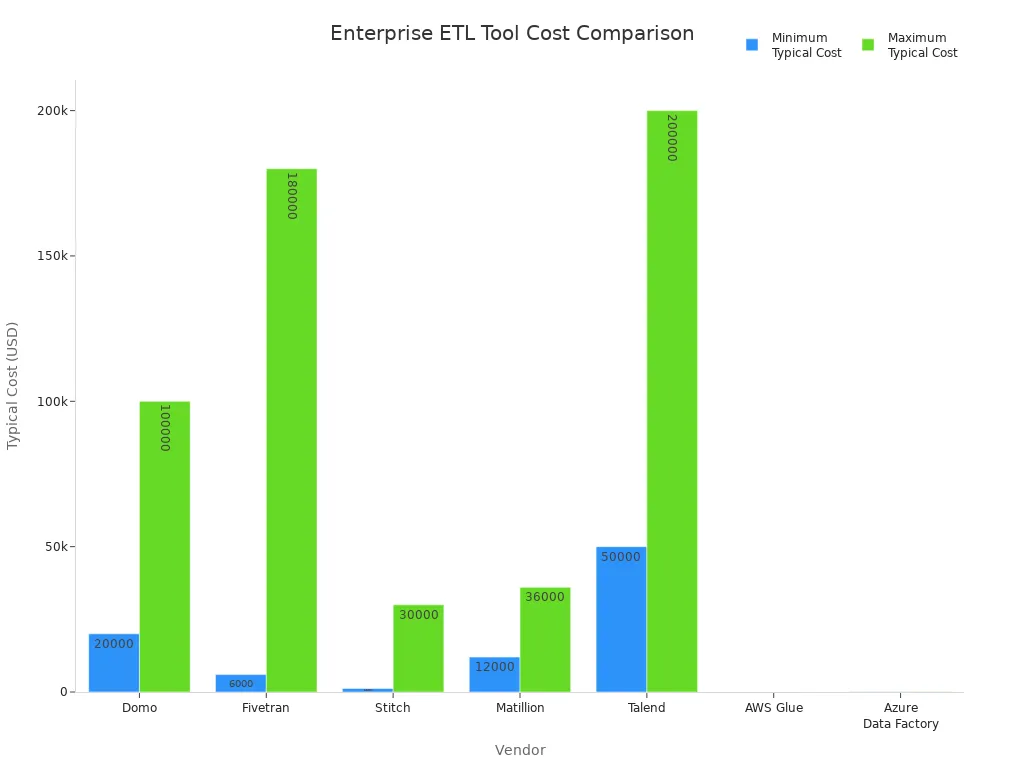
| Vendor | Model | Typical Range | Best Fit Use Case |
|---|---|---|---|
| Domo | Credit-based | $20k–$100k+/year | ETL within full BI platform |
| Fivetran | Monthly Active Rows | $500–$15k+/month | Automated ELT for multiple data sources |
| Stitch | Row-based subscription | $100–$2,500/month | Small to mid-size teams |
| Matillion | vCore-hour credits | $1,000–$3,000+/month | Cloud warehouses |
| Talend | Enterprise licensing | $50k–$200k+/year | Compliance & governance |
| AWS Glue | DPU-hours (serverless) | ~$0.44/hr per DPU | AWS-native workloads |
| Azure Data Factory | vCore + operations | <$50/job typical, varies | Azure-native ETL & orchestration |
Reliable customer support ensures you resolve issues quickly and prevent data loss. You need ETL vendors that offer responsive support, detailed documentation, and training resources. FineDataLink provides step-by-step guides and a user-friendly interface, helping you deploy and manage real-time data integration with confidence. Strong support helps you maintain high data quality and efficient data management.
| Criteria | Description |
|---|---|
| Scalability | The ability to handle increasing volumes of data without performance loss. |
| Performance | Fast data processing and low latency to ensure reliability and efficiency. |
| Pricing | Transparent pricing options that fit within the organization's budget. |
| Customer Support | Availability of support to resolve issues and prevent data loss. |
| Security and Compliance | Ensuring data safety through compliance certifications and encryption measures. |
Website: https://www.fanruan.com/en/finedatalink
FineDataLink stands out as a modern, scalable, and cost-effective ETL solution. You use a low-code platform to simplify complex data integration tasks. FineDataLink enables real-time data synchronization and supports over 100 data sources. You benefit from sub-second latency and true real-time data integration, which reduces manual effort and total cost of ownership. The platform complies with major standards, including SOC 2 Type II and GDPR, making it suitable for enterprises that prioritize security and efficiency.
Tip: When you compare the most reliable ETL tools for enterprise data integration, consider FineDataLink for its user-friendly interface, real-time data sync, and significant cost savings.
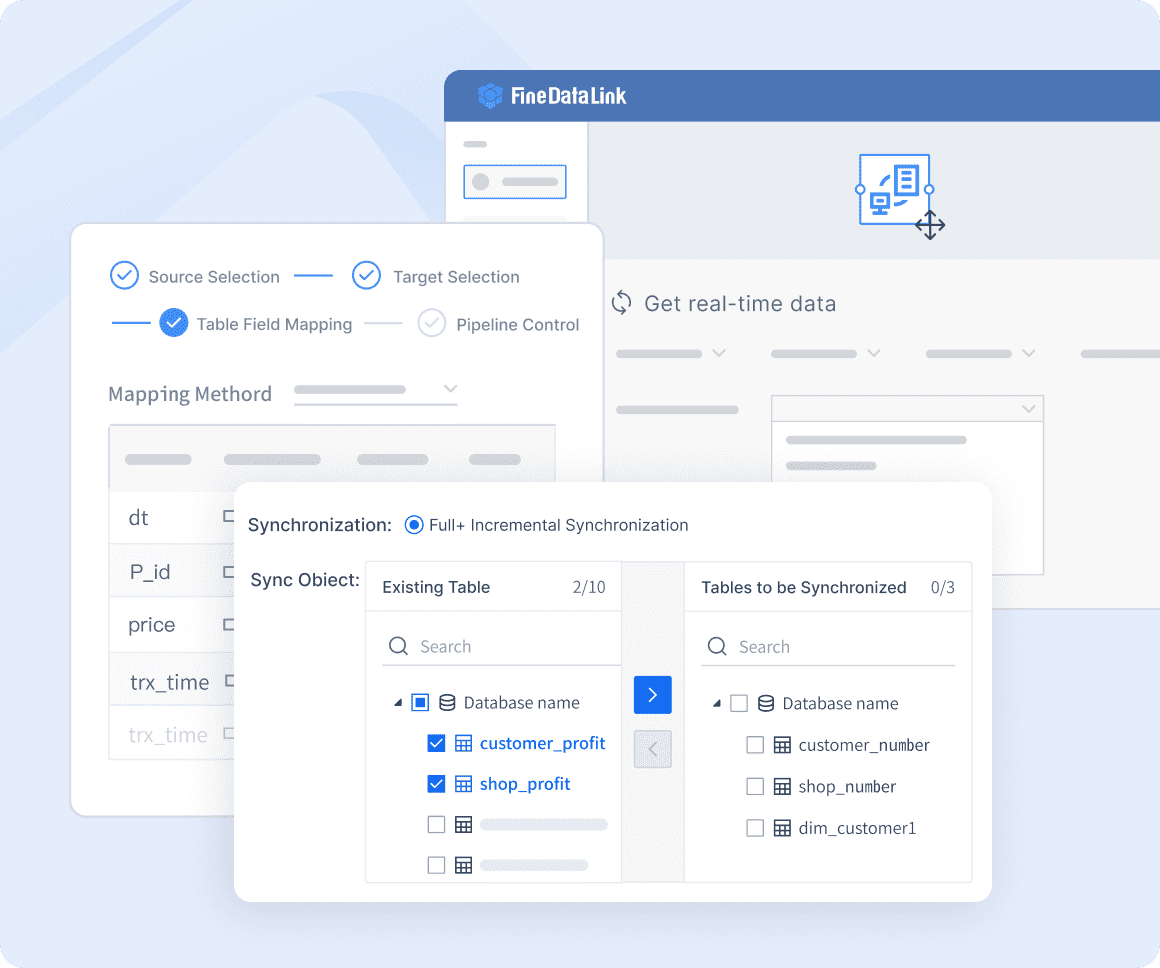
Website: https://www.informatica.com/ja/products/data-integration/powercenter.html
You find Informatica PowerCenter at the top of many lists when comparing the most reliable ETL tools for enterprise data integration. This platform offers seamless data extraction, powerful transformation capabilities, and high scalability. You can integrate both cloud and on-premises systems, which gives you flexibility for hybrid environments. Informatica supports robust data governance and compliance, making it suitable for large organizations that need reliability and security.
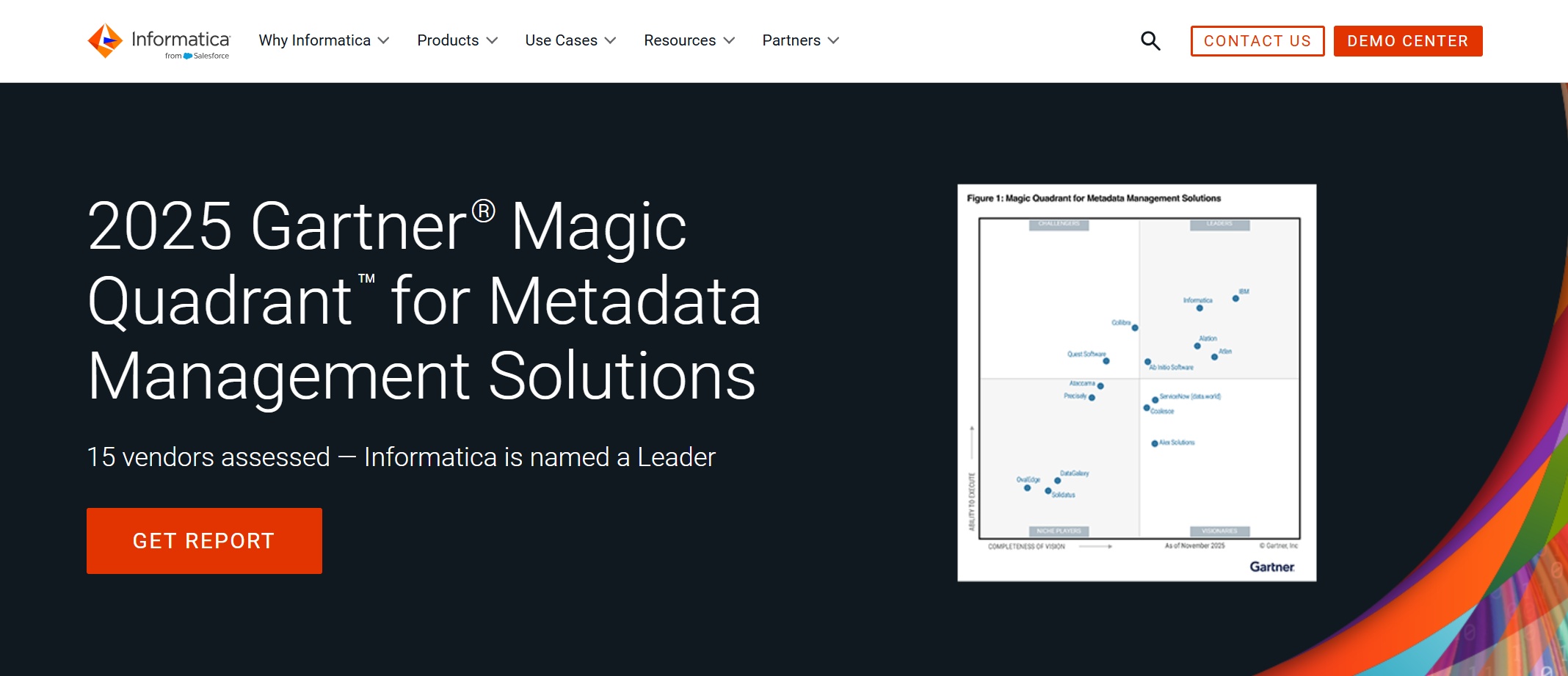
Website: https://www.talend.com/
Talend stands out for its ability to manage large-scale data pipelines and maintain consistent data quality. You benefit from efficient resource usage and reduced latency, which are critical for scalability. Talend’s automation features help you streamline ETL processes, making it a reliable choice for enterprises that require real-time data integration and processing.
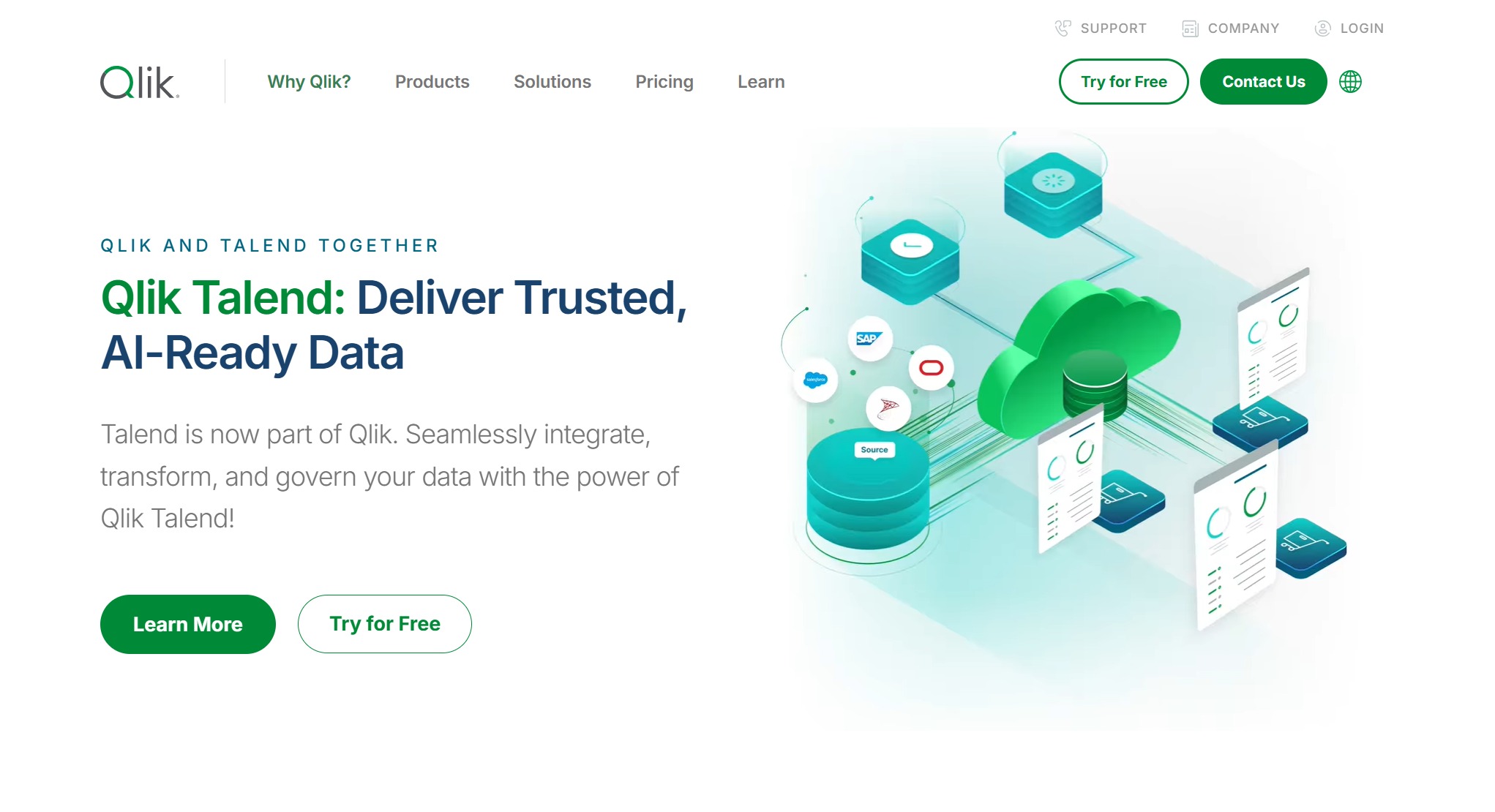
Website: https://learn.microsoft.com/en-us/sql/integration-services/sql-server-integration-services
Microsoft SSIS simplifies ETL workflow design and integrates well with the Microsoft ecosystem. You can scale from small to large ETL projects and customize workflows extensively. SSIS ensures data quality and security, which supports enterprise compliance needs. You may encounter challenges with performance tuning and package deployment, but its strengths in flexibility and comprehensive data handling make it a popular choice.
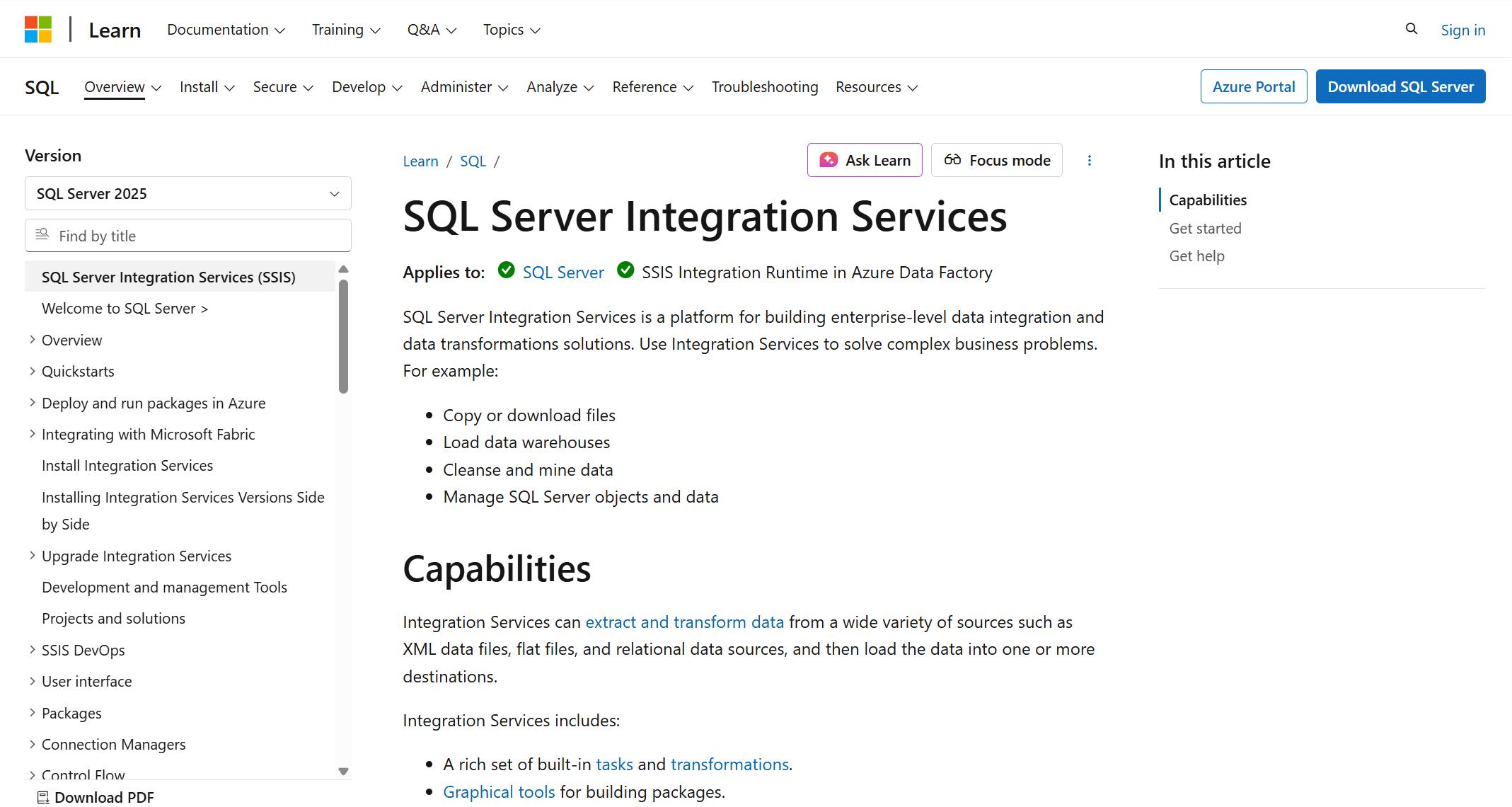
Website: https://nifi.apache.org/
Apache NiFi provides reliability and scalability through clustering and asynchronous queuing. You can handle increased data loads and adjust throughput by scaling tasks. NiFi supports real-time data flow management, which is essential for enterprises that need adaptable ETL solutions for various environments.
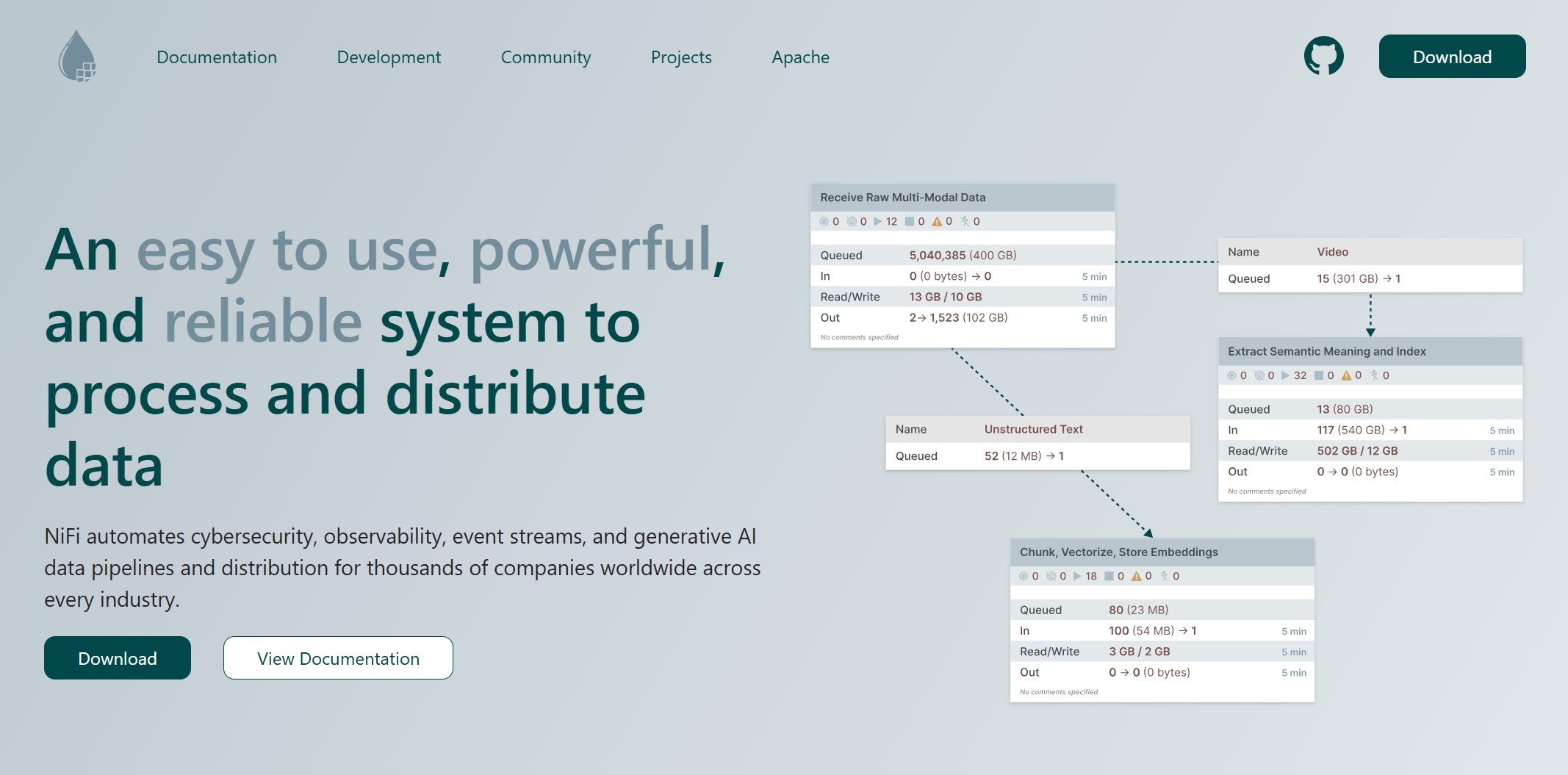
Website: https://www.ibm.com/products/datastage
IBM DataStage efficiently processes ETL tasks across diverse data sources. You gain strong data quality and governance features, along with robust security measures. DataStage automates integration, scales for large volumes, and offers flexibility for complex enterprise data environments. You save time and resources by reducing manual processes.
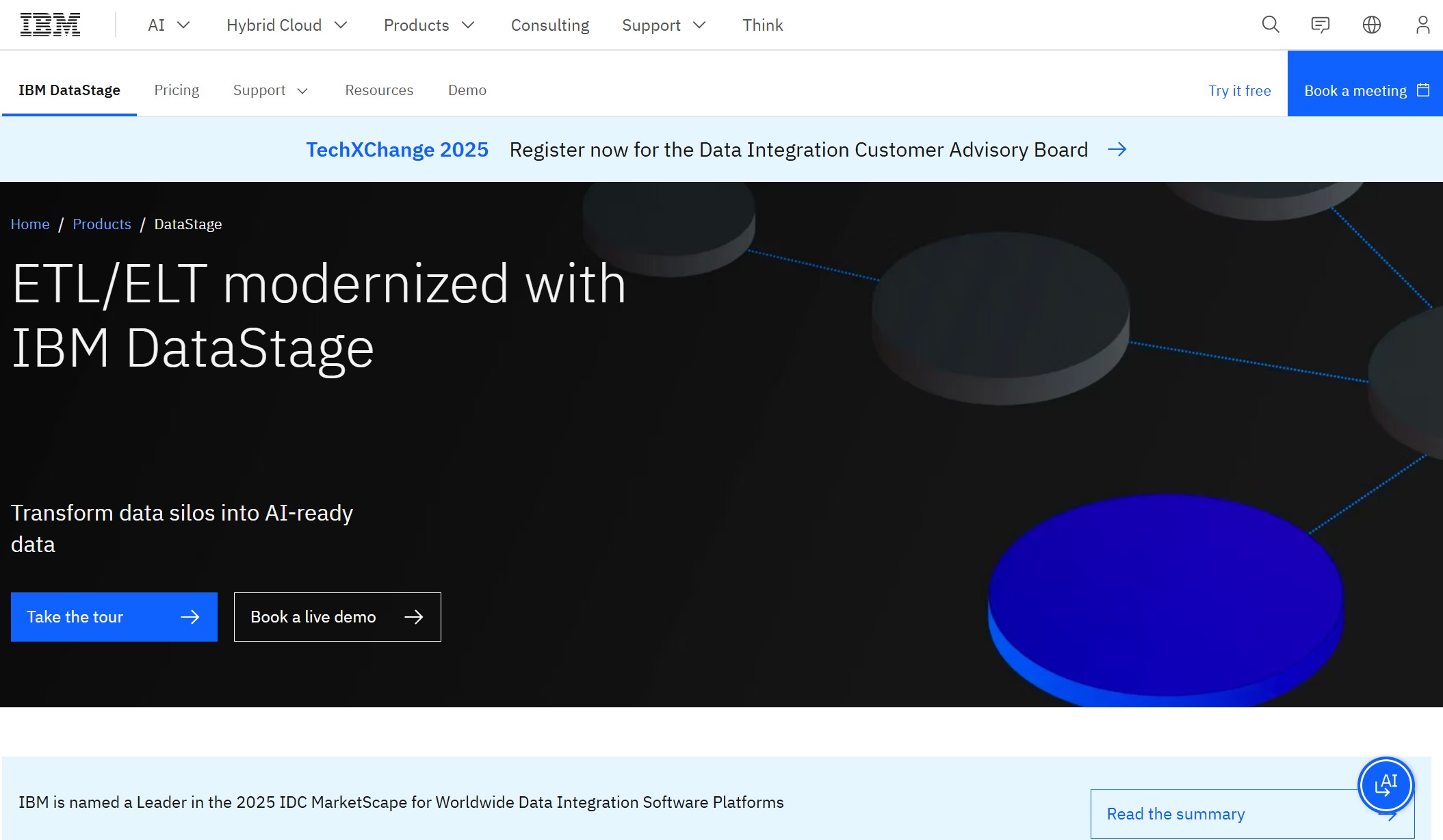
Website: https://www.oracle.com/apac/middleware/technologies/data-integrator.html
Oracle Data Integrator excels in reliability and integration capabilities for large enterprises. You can process high-volume data and perform complex transformations. ODI’s ELT architecture minimizes data movement, which enhances performance and scalability. You benefit from integration with over 100 data sources, including cloud platforms and big data frameworks.
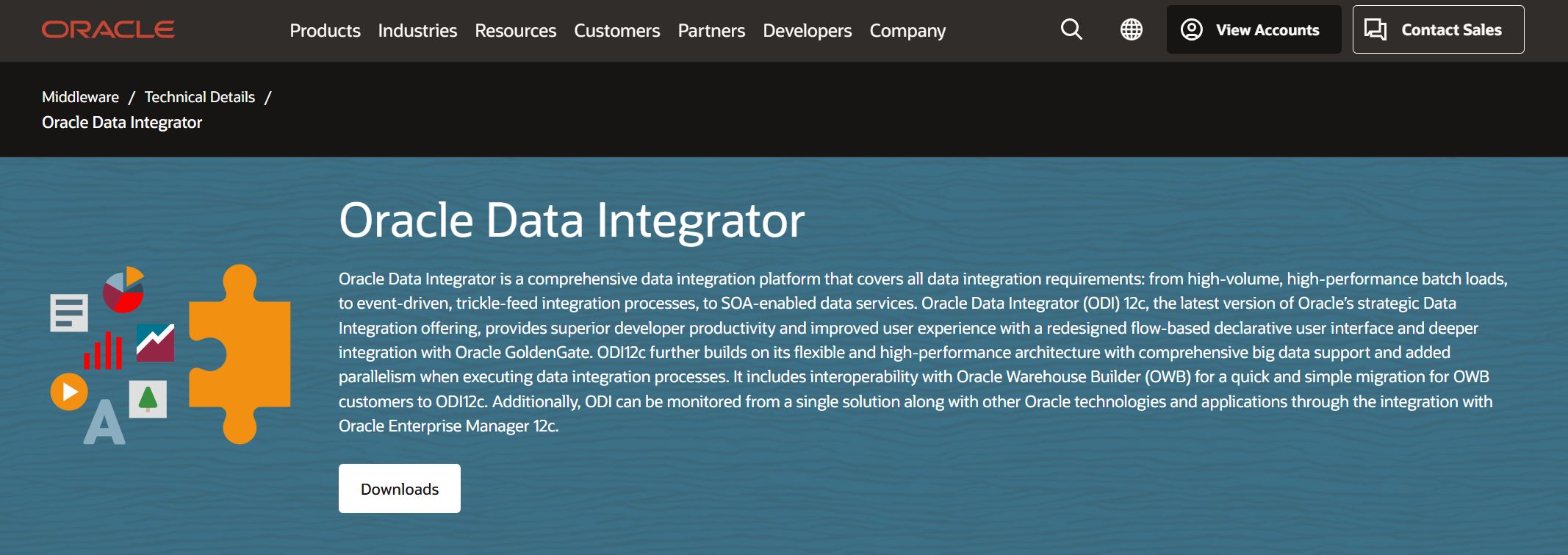
Website: https://www.sap.com/products/data-cloud/data-services.html
SAP Data Services delivers robust data extraction, transformation, and loading. You can manage both real-time and batch processing, ensuring timely and accurate data delivery. The platform supports data quality management and integrates with SAP and non-SAP systems, making it suitable for enterprises with diverse data environments.
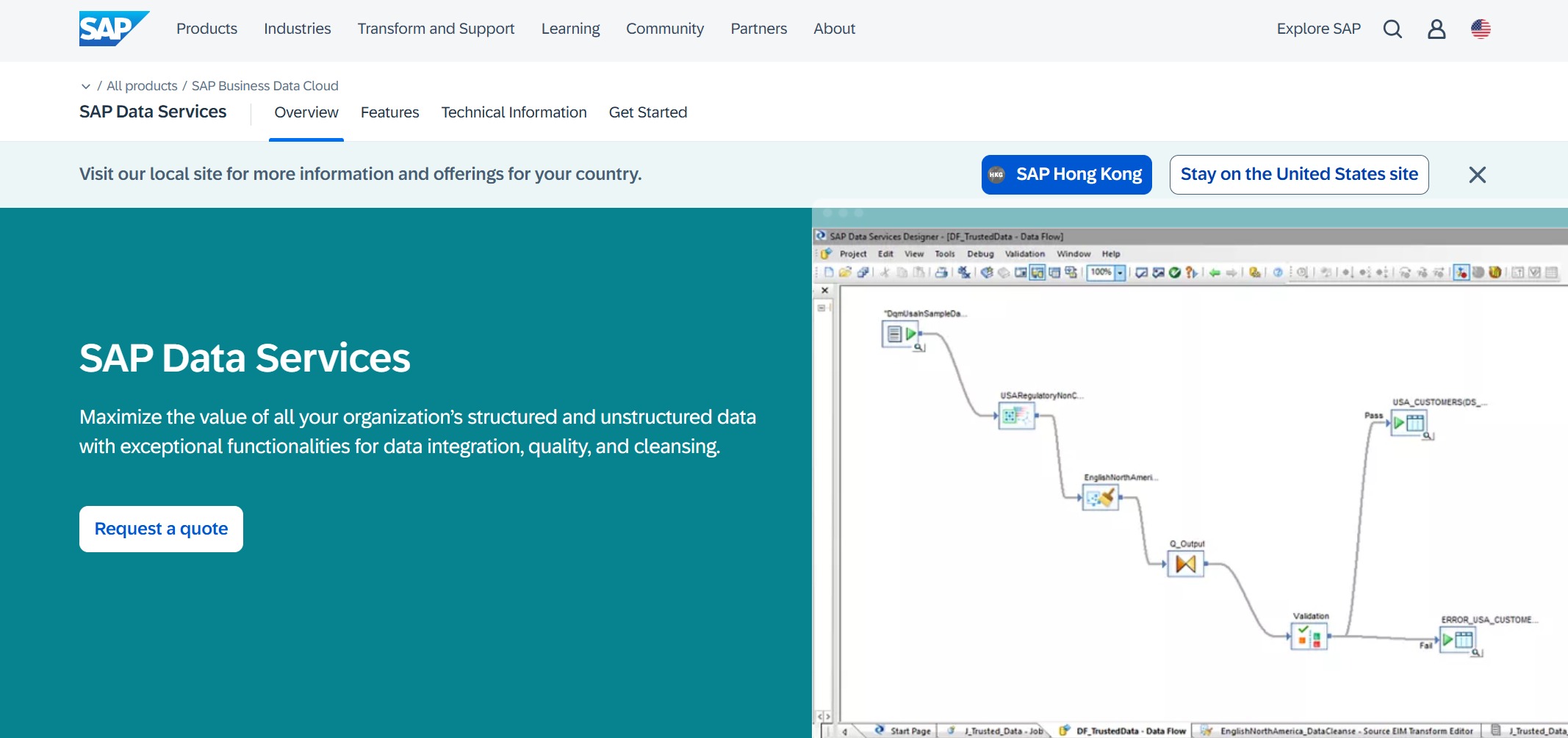
Website: https://pentaho.com/products/pentaho-data-integration/
Pentaho Data Integration supports large-scale data processing and connects seamlessly with databases, cloud services, and big data platforms. You ensure accurate and timely information for decision-making. Pentaho’s scalability and integration capabilities make it reliable for both small and enterprise-level applications.
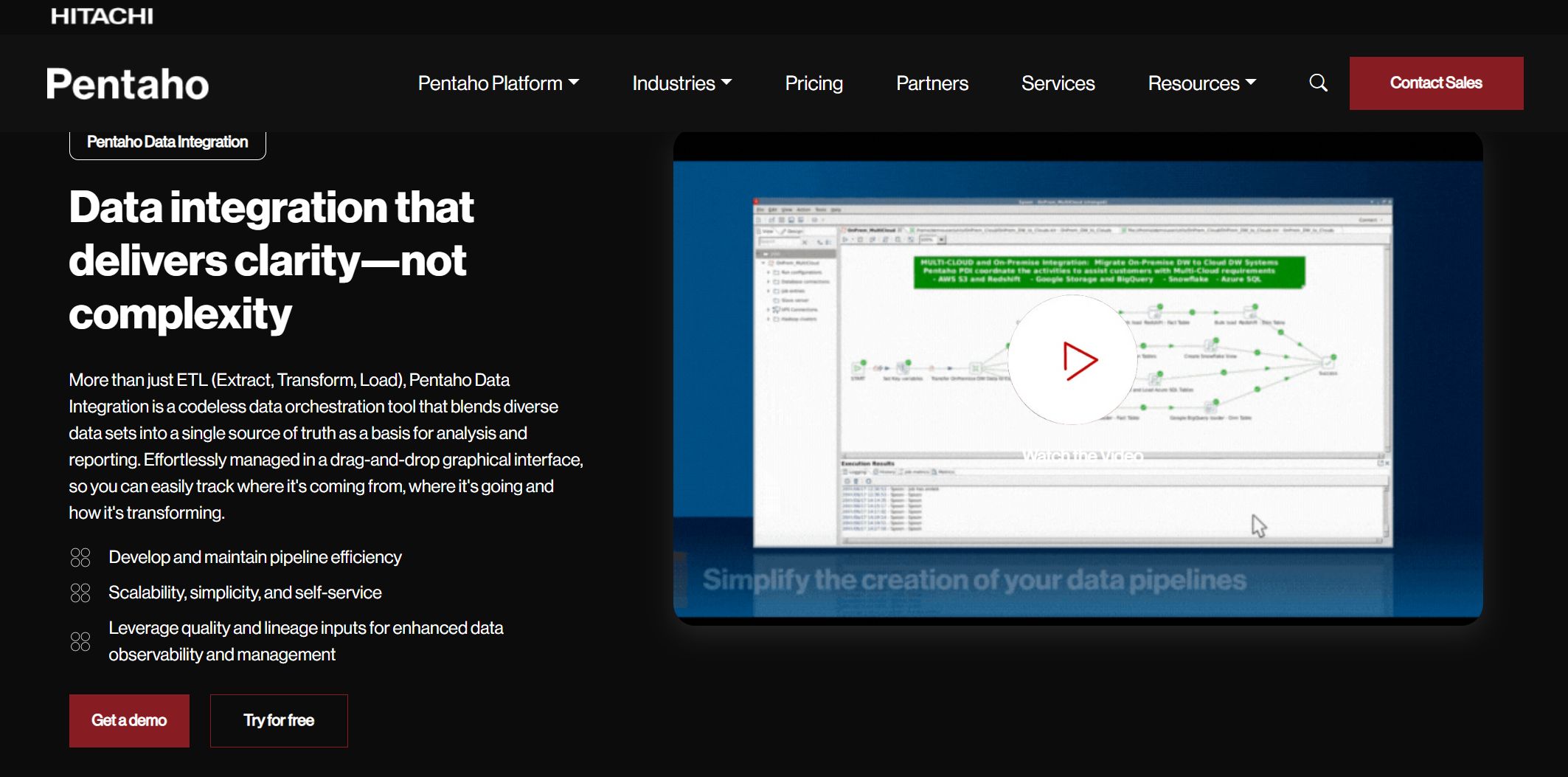
Website: https://www.fivetran.com/
Fivetran offers automated, zero-maintenance ETL pipelines. You can replicate over 50 GB of data per hour and handle billions of rows monthly. Fivetran’s change data capture and automated schema management deliver real-time data updates without coding. You benefit from incremental replication, which reduces unnecessary data loads.
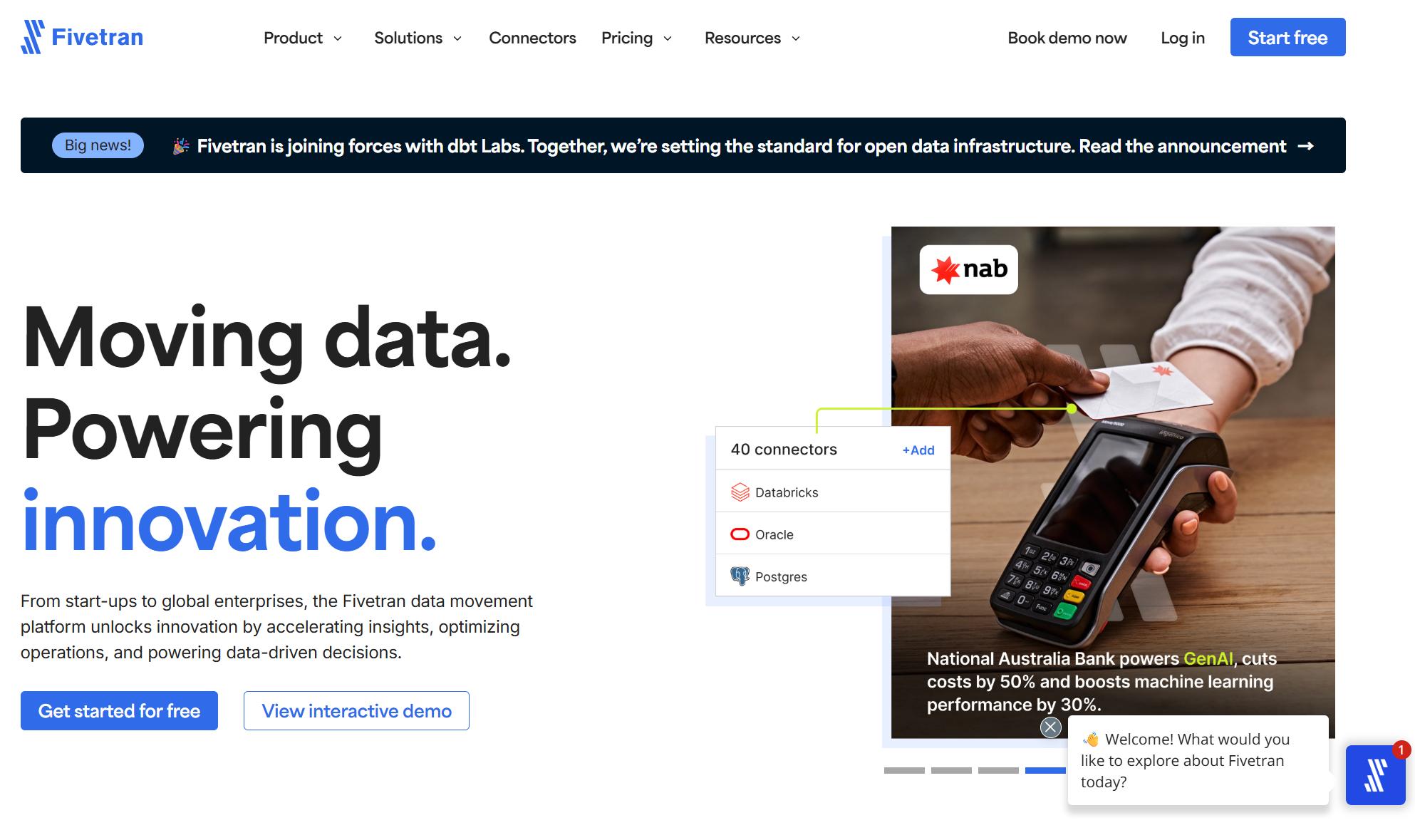
Website: https://www.matillion.com/
Matillion streamlines complex data pipelines and integrates efficiently with cloud platforms. You can manage data workflows with cloud-native architecture, ensuring scalability and reliability. Matillion provides pre-built connectors and advanced transformation components, which help you centralize and cleanse data for enterprise analytics.
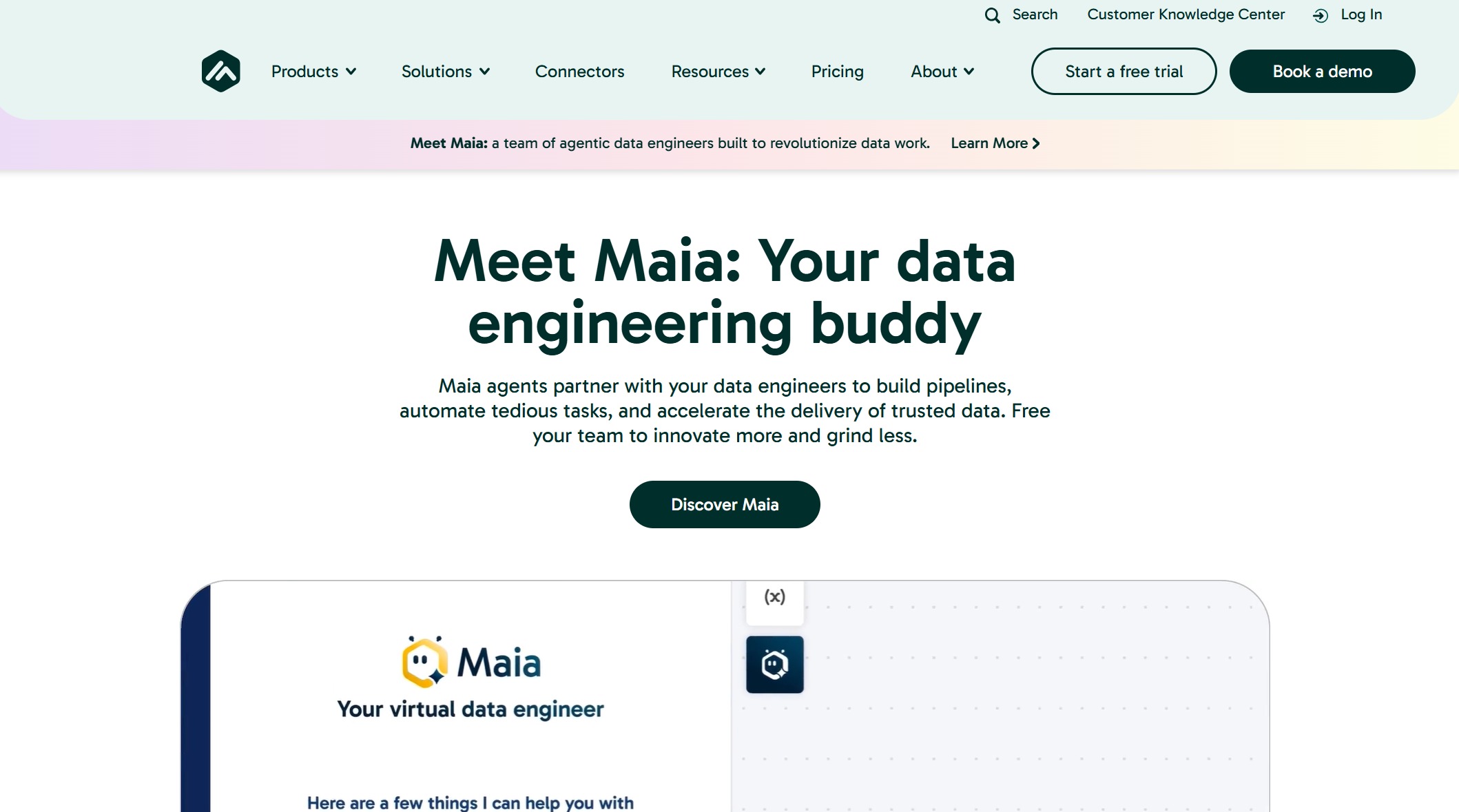
Website: https://rivery.io/
Rivery delivers high reliability for enterprise-grade ETL. You can automate data integration and scale for large volumes. The platform supports real-time data processing and offers flexible solutions for hybrid environments.
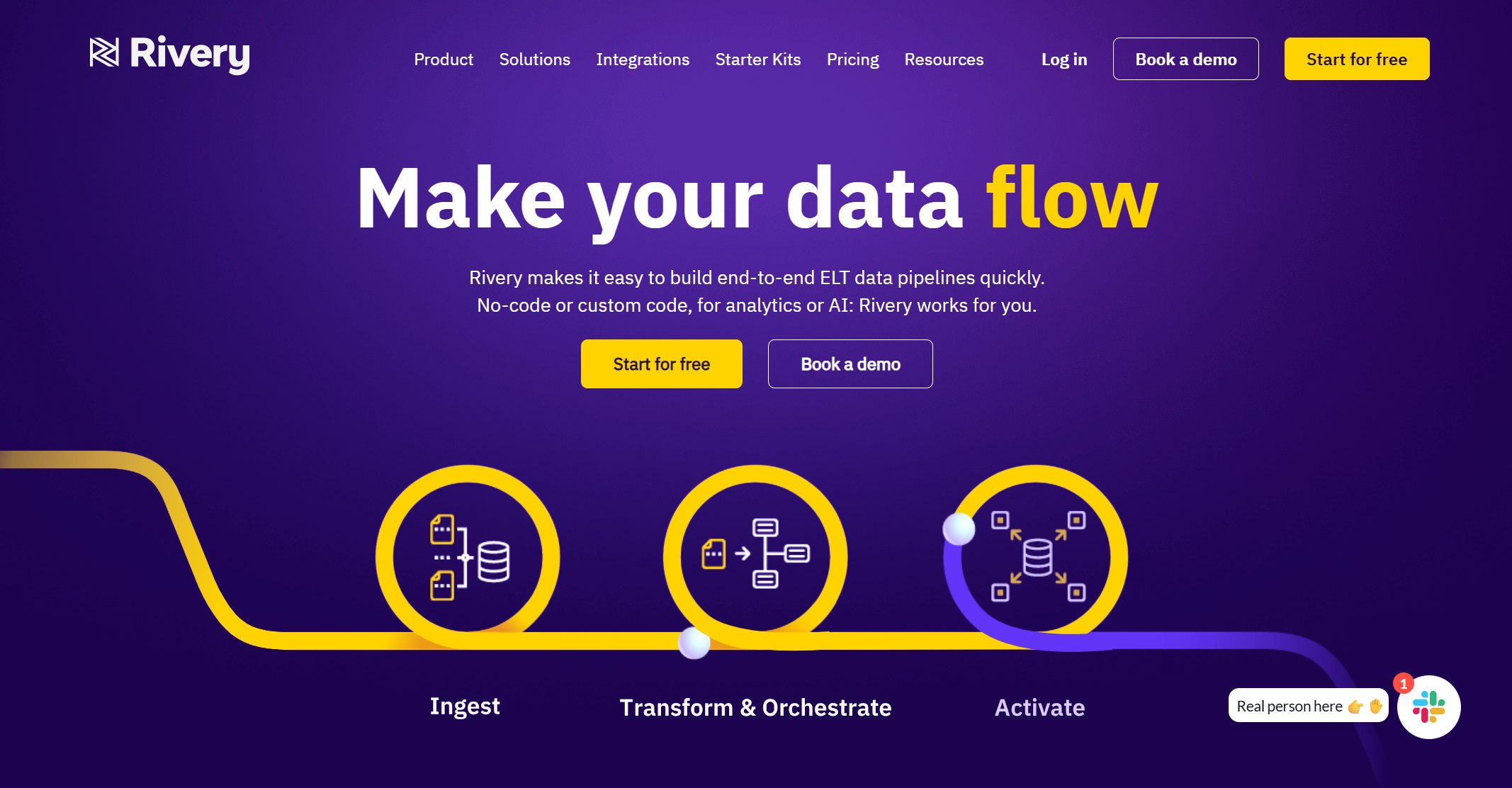

When you look at an etl tool comparison between FineDataLink and Informatica, you notice clear differences in user experience and technical features. FineDataLink gives you a user-friendly interface that simplifies complex data integration tasks. You can set up real-time data pipelines quickly, even if you do not have deep technical expertise. Informatica offers powerful features, but you may find the platform complex and better suited for users with advanced skills. Both tools support real-time integration, but FineDataLink stands out for its broad connectivity, especially with SAP systems. The table below summarizes the main points:
| Feature | FineDataLink | Informatica |
|---|---|---|
| User-Friendliness | Highlighted for its user-friendliness | Often seen as complex, requiring expertise |
| Real-Time Integration | Supports real-time data processing | Powerful features, but complexity exists |
| Connectivity | Comprehensive options, especially in SAP | Advanced functionalities, but steeper learning curve |
You benefit from FineDataLink's low-code approach, which makes it easier to manage real-time data integration across many sources.
You may want to compare Talend and Microsoft SSIS when choosing an etl tool for your enterprise. Here are the main points to consider:
This data integration tool comparison helps you decide which platform fits your technical environment and budget.
Apache NiFi and IBM DataStage both serve as reliable etl tools, but they target different needs. You use NiFi for real-time data flow management and flexible pipeline design. NiFi works well when you need to move and transform data quickly between systems. DataStage focuses on large-scale enterprise deployments. You get strong data governance, automation, and security features. DataStage suits organizations that need robust compliance and high-volume processing. If you want flexibility and real-time data movement, NiFi is a strong choice. For structured, large-scale etl, DataStage stands out.
Oracle Data Integrator and SAP Data Services both offer enterprise-grade etl solutions. You choose Oracle for advanced data transformation and integration with cloud and big data platforms. Oracle’s ELT architecture reduces data movement and improves performance. SAP Data Services supports both real-time and batch processing. You benefit from strong data quality management and integration with SAP and non-SAP systems. Your choice depends on your existing infrastructure and the type of data integration you need.
Pentaho Data Integration and Fivetran both help you automate etl processes. Pentaho gives you flexibility and supports complex data workflows. You can connect to many databases, cloud services, and big data platforms. Fivetran focuses on automated, zero-maintenance pipelines. You get real-time updates and incremental replication with minimal setup. If you want control and customization, Pentaho is a good fit. If you prefer simplicity and real-time data sync, Fivetran offers a streamlined solution.
When you compare the most reliable ETL tools for enterprise data integration, you need a clear overview of each platform’s strengths. This summary table helps you evaluate the top solutions based on features and reliability. You can use this information to choose the best ETL tool for your enterprise data integration needs.
| ETL Tool | Scalability | Automation | Integration | Cost Efficiency | Support | Reliability |
|---|---|---|---|---|---|---|
| FineDataLink | High | Advanced | 100+ sources | Cost-effective | Extensive docs | Real-time sync |
| Informatica PowerCenter | Enterprise-grade | Robust | Hybrid/cloud/on-prem | Premium | 24/7 support | Proven stability |
| Talend | Flexible | Strong | Wide connectivity | Moderate | Community & paid | Consistent |
| Microsoft SSIS | Scalable | Good | Microsoft stack | Bundled | Microsoft support | Reliable |
| Apache NiFi | Cluster-ready | Event-driven | Real-time flows | Open-source | Community | High throughput |
| IBM DataStage | Large-scale | Automated | Diverse sources | Premium | IBM support | Enterprise-grade |
| Oracle Data Integrator | High | ELT automation | Big data/cloud | Premium | Oracle support | Robust |
| SAP Data Services | Enterprise | Automated | SAP/non-SAP | Premium | SAP support | Reliable |
| Pentaho Data Integration | Flexible | Good | Many connectors | Open-source | Community | Consistent |
| Fivetran | Cloud-native | Fully automated | SaaS/cloud | Subscription | Online resources | Real-time updates |
| Matillion | Cloud-native | Automated | Cloud warehouses | Subscription | Online resources | Reliable |
| Rivery | Scalable | Automated | Hybrid/cloud | Subscription | Online resources | Reliable |
You should focus on scalability and automation when comparing the most reliable ETL tools for enterprise data integration. These features help you manage large data volumes and reduce manual effort.
You can use this summary table to guide your decision when comparing the most reliable ETL tools for enterprise data integration. Select the platform that matches your scalability, automation, and support requirements.
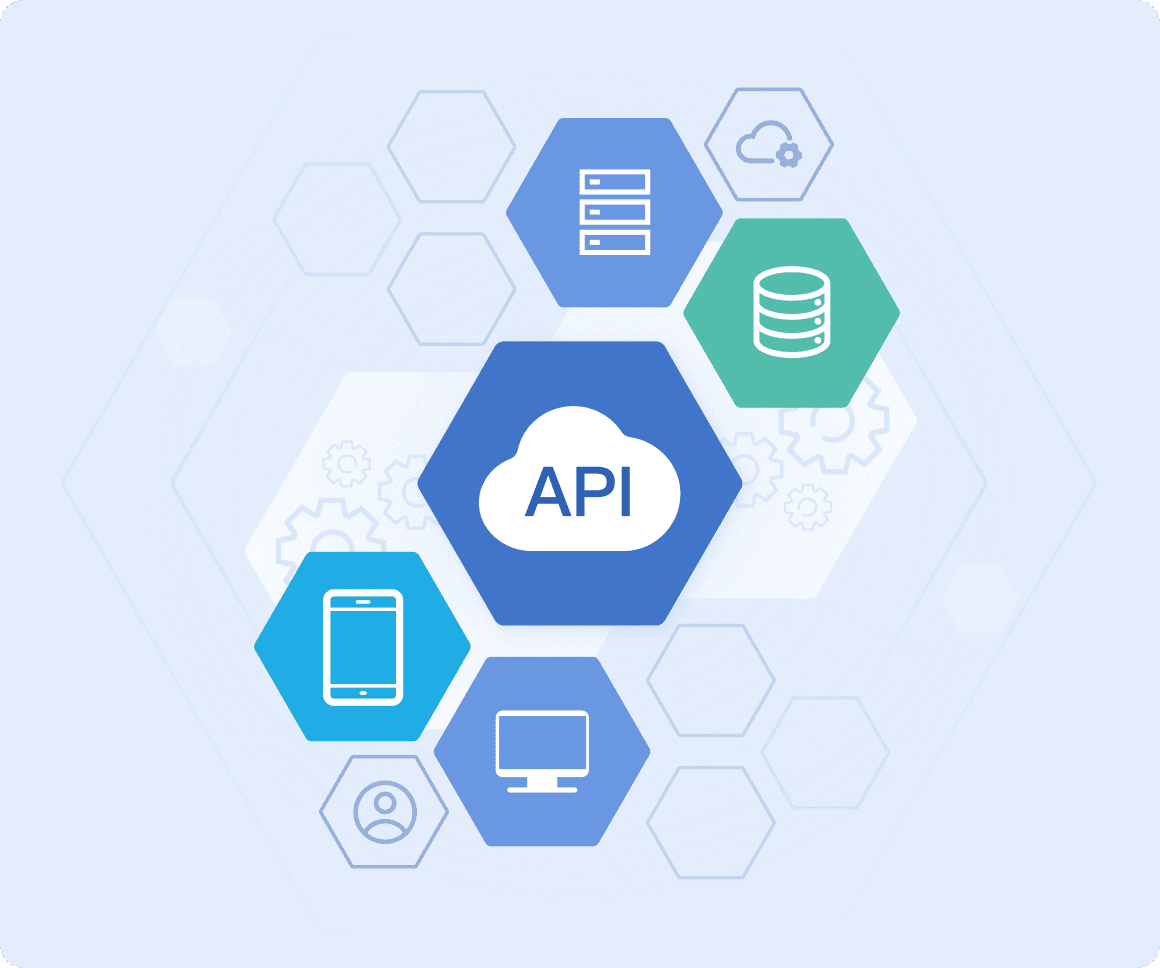
If you manage a large enterprise, you need a solution that can handle complex environments and high volumes of data. You should look for platforms that offer strong scalability, advanced automation, and robust security. FineDataLink, Informatica PowerCenter, and IBM DataStage stand out in these areas. FineDataLink provides a low-code interface and real-time synchronization, which helps you streamline your workflows. Informatica PowerCenter delivers proven stability and extensive support for hybrid environments. IBM DataStage offers enterprise-grade automation and governance. These tools help you maintain reliable operations and support your business intelligence needs.
Tip: Choose a platform with strong compliance features and broad integration options to future-proof your enterprise data strategy.
Cloud integration has become essential for modern organizations. You need an ETL tool that connects seamlessly with cloud data warehouses and SaaS applications. Fivetran and Matillion both offer cloud-native architectures and automated pipelines. FineDataLink also supports over 100 data sources, including popular cloud platforms. These solutions help you move and transform data efficiently in real time. You can scale your operations as your business grows, without worrying about infrastructure limits.
If you want to maximize efficiency while controlling costs, you should consider solutions that offer transparent pricing and flexible licensing. FineDataLink stands out for its cost-effective approach and low-code platform. Pentaho Data Integration and Stitch also provide open-source or subscription-based models that fit smaller budgets. These tools help you automate ETL processes and reduce manual work, which saves time and resources.
| Tool | Pricing Model | Best For |
|---|---|---|
| FineDataLink | Flexible, affordable | Enterprises, SMBs |
| Pentaho | Open-source | Custom workflows |
| Stitch | Subscription | Small to mid-size teams |
Note: Evaluate the total cost of ownership, including support and maintenance, when comparing ETL tools for enterprise data integration.
Flexibility is important if your organization needs to adapt quickly to changing requirements. You should look for ETL tools that support a wide range of data sources and offer customizable workflows. Talend and Apache NiFi provide strong options for flexible integration. FineDataLink also excels with its drag-and-drop interface and support for both real-time and batch processing. These platforms let you build and modify data pipelines without extensive coding, which increases your team's agility.
When you compare the most reliable ETL tools for enterprise data integration, prioritize flexibility if your data landscape changes often or if you need to support multiple business units.
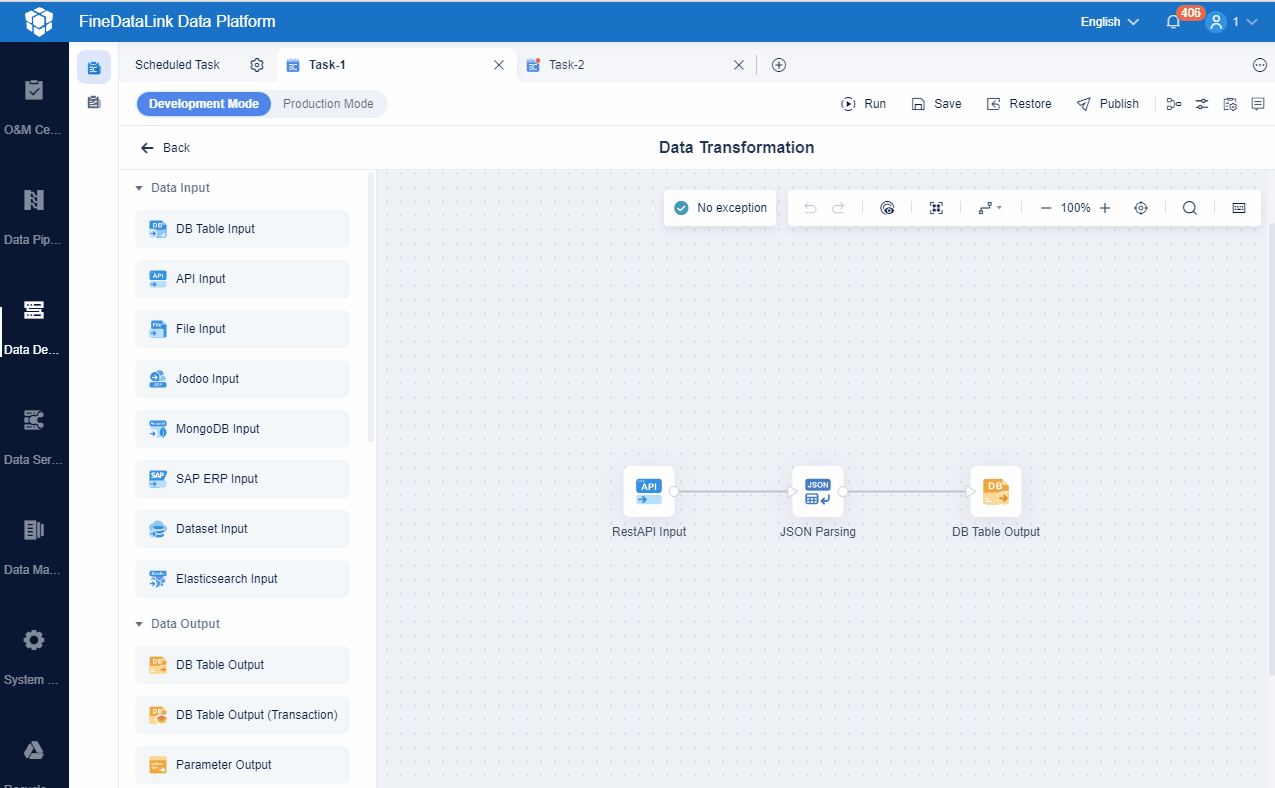
When you compare the most reliable ETL tools for enterprise data integration, you see that reliability, scalability, and cost shape your decision. The table below highlights how leading platforms perform:
| ETL Tool | Reliability | Scalability | Cost |
|---|---|---|---|
| Informatica PowerCenter | High | High | High |
| Talend | Moderate | High | Variable |
| AWS Glue | High | High | Pay-as-you-go |
| Microsoft SSIS | High | Moderate | Variable |
You gain high data quality control and proven methods for historical data, but you may face limited real-time functionality and longer implementation cycles. FineDataLink offers a low-code platform, real-time sync, and cost-effective integration. You can request a demo to explore how FineDataLink fits your enterprise needs.
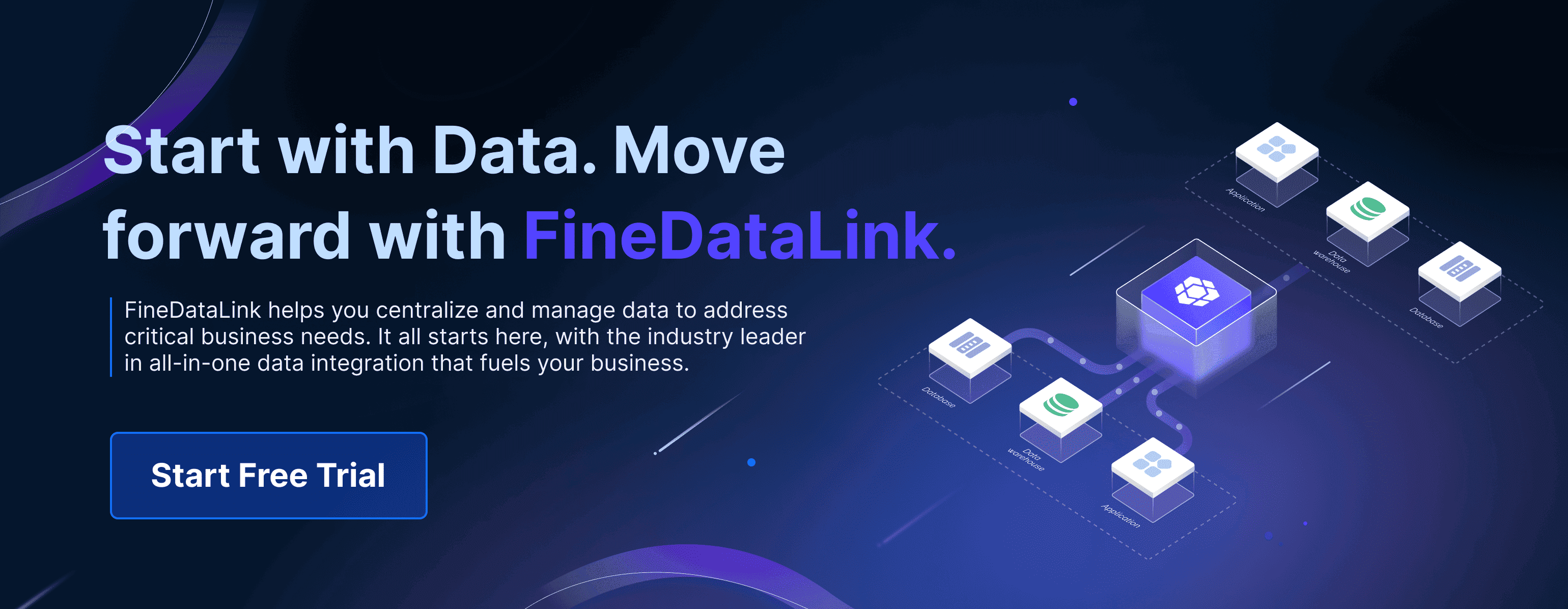
Enterprise Data Integration: A Comprehensive Guide
What is enterprise data and why does it matter for organizations
Understanding Enterprise Data Centers in 2025
Enterprise Data Analytics Explained for Modern Businesses

The Author
Howard
Data Management Engineer & Data Research Expert at FanRuan
Related Articles
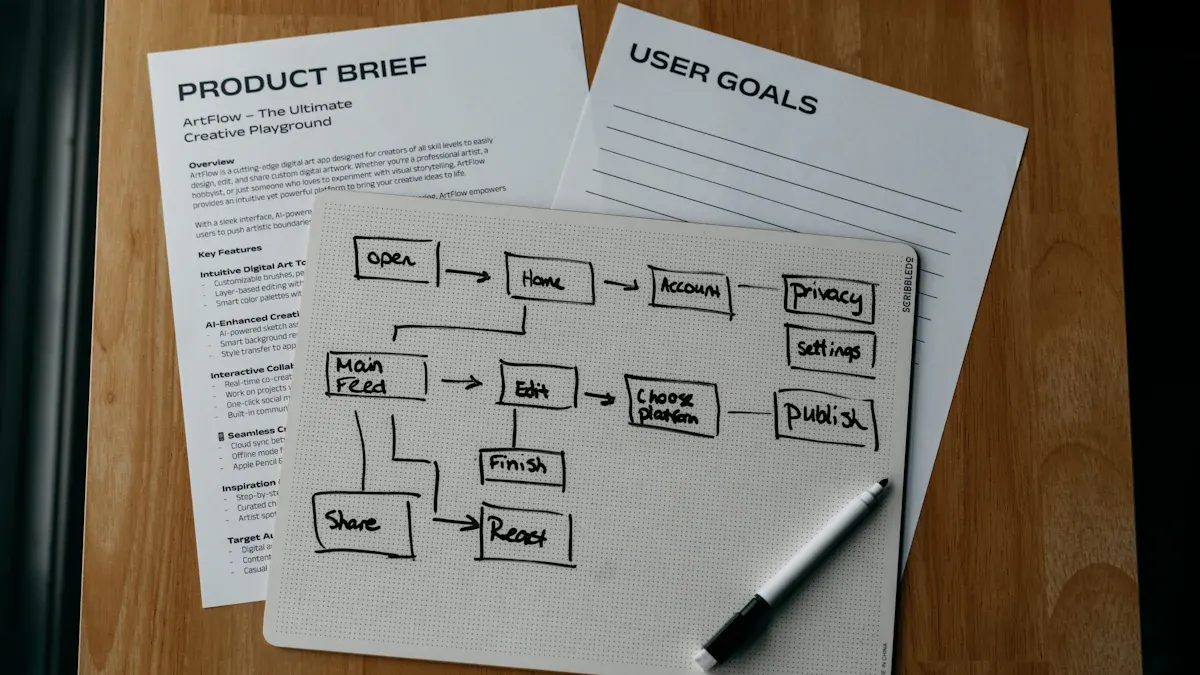
What is a data management platform in 2025
A data management platform in 2025 centralizes, organizes, and activates business data, enabling smarter decisions and real-time insights across industries.
Howard
Dec 22, 2025

Top 10 Database Management Tools for 2025
See the top 10 database management tools for 2025, comparing features, security, and scalability to help you choose the right solution for your business.
Howard
Dec 17, 2025

Best Data Lake Vendors For Enterprise Needs
Compare top data lake vendors for enterprise needs. See which platforms offer the best scalability, integration, and security for your business.
Howard
Dec 07, 2025